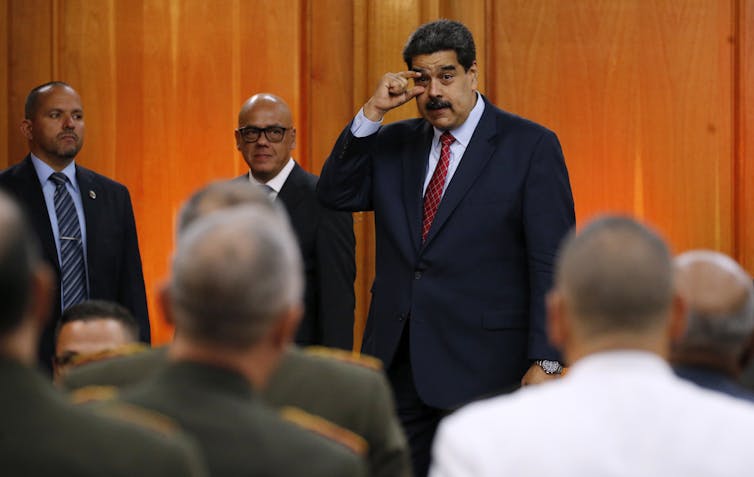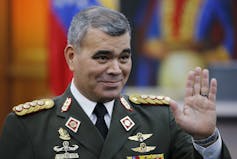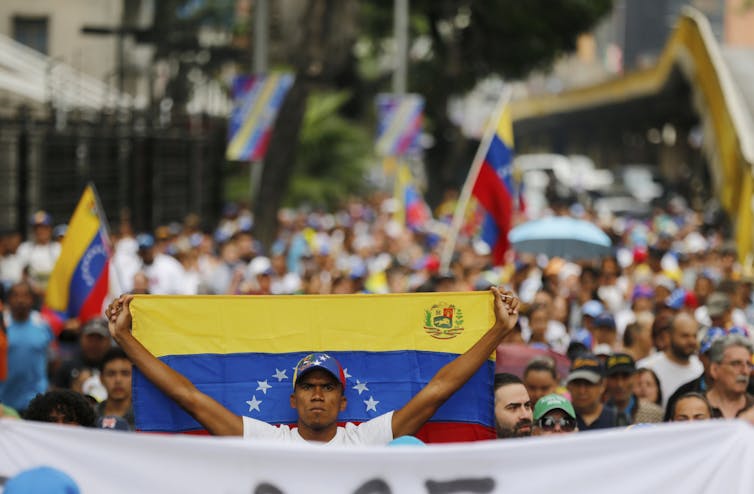
Venezuela’s opposition leader, Juan Guaido, is continuing to pressure President Nicolás Maduro to resign.
Countries around the world, including Canada, have recognized Guaido as Venezuela’s rightful leader. The United States, meantime, is threatening to deprive Maduro’s administration of oil revenue after an election that has been widely condemned as illegitimate.
Gen. Vladimir Padrino López, defense minister in Maduro’s government, has said that the country’s armed forces support the status quo. He argues that they respect Venezuela’s constitution and its laws.
But it’s quite clear that the Venezuelan military does nothing of the sort. The country’s armed forces are now a military political party that participates openly in Venezuelan politics by supporting a corrupt and violent regime.
It contradicts a key article in the Venezuela constitution that states that the armed forces constitute a professional institution, without political militancy, that is at the exclusive service of the nation. It is not meant, in any way, to be a political organization.

None of this seems to matter to Padrino López, who at the end of his speeches loudly shouts: “Independence and Socialist Homeland, we will live and we will win!” and ends with the slogan: “Chávez lives, the fatherland continues!”
Venezuelan historian Manuel Caballero has argued that the worst thing that Hugo Chávez did — as the coup leader of 1992 who turned into a presidential candidate who won in 1998 —was to reintroduce the military party into the Venezuelan political dynamic.
Since its birth as an independent republic, Venezuela has lived under the shadow of militarism in what writer Ana Teresa Torres has called the “heritage of the tribe.” Militarism was front and centre in a prolonged civil war in the 19th century and in dictatorships in the 20th century, the most brutal of them led by generals Juan Vicente Gomez and Marcos Pérez Jimenez.
Military pledged to stay out of politics
The civilian democracy that was born in 1958 featured a commitment from the military to stay out of politics and stick to defence.
The violent rise of Chávez in 1992 changed this dynamic, however, and again gave the military veto power over the political life of the country. In fact, Chávez dedicated himself to establishing a privileged caste, with access to multimillion-dollar budgets, that now controls key government corporations, such as the oil company PDVSA and businesses that extract gold and other minerals from the jungles of Venezuela.
This caste has been accused of forming a criminal cartel known as the “narcosoles.”
Never in the history of Venezuela has a military group been as corrupt as the current high command of the armed forces. It is the pillar that supports Maduro, one that’s apparently decided to support at any cost the political and military oligarchs in power.
Democracy will require army co-operation
The transition to democracy, unfortunately, won’t take place in Venezuela without the participation of the armed forces to reinstate the constitutional order in a hopefully peaceful way. It is the consequence of years of the destruction and repudiation of the institutions of the civil republic (such as the National Assembly, the only truly elected institution in the country), and of a systematic violent repression of political opponents set in motion by the generals and their subordinates.
Of course, this military party is not just an impartial referee. It is an armed political actor with a gun to the head of a society that is urgently demanding a return to democracy.

If there is a change in Venezuela, it will be necessary to ask what role the military should play in the new democracy, and even if the armed forces should be eliminated as they were in Costa Rica. At the very least, lessening the military’s scope so that it functions primarily as national police force is necessary.
Ending militarism is the only way to achieve freedom, peace and progress in Venezuela.![]()
Isaac Nahon-Serfaty, Associate Professor, University of Ottawa
This article is republished from The Conversation under a Creative Commons license.


